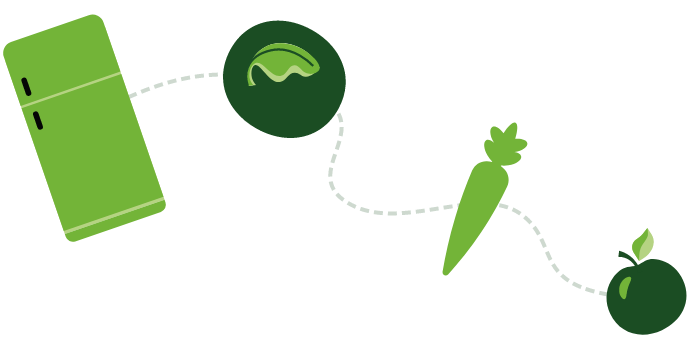Fourth of July is right around the corner and with that comes the time to celebrate with friends and family. However, this celebration also is a time where there is a lot of environmental damage and waste.
84% of Americans celebrated July 4th last year and are projected to drop nearly $21 billion on food alone ($84 per person). With everyone cooking up their favorite dishes, there’s bound to be food waste, after all 43% of all food waste occurs at home.
So here are some sustainable swaps that you can use to reduce your food waste during your 4th of July celebration.
Consider Grilling Differently
The first thing that comes to mind when someone thinks of 4th of July is a barbeque. However, this common tradition provokes more pollution due to the greenhouse gas emissions that your grill releases as well as eating red meat.
Consider switching to chicken which could cut those emissions by a quarter. Or, even better, switch to plant based meats. Try using patties from brands like Impossible Foods. Their burgers contain heme, giving the viewers the impression that the burger is “bleeding” while cooking and has the closest meat-like taste.
Another great way to reduce your plastic waste is to think outside the bun. Lots of meat is cling wrapped on styrofoam trays and buns are wrapped in plastic bags. A sustainable alternative is to grill skewers. Grab fresh produce like onions, tomatoes, peppers, and pineapple, add your meat of choice, and assemble them on compostable bamboo skewers.
If you are set on burgers, here are a few tips to eliminate plastic waste:
- Bring your own container to the grocery store butcher counter
- Buy buns from a local bakery or make them yourself
- Buy condiments in glass jars
- Get toppings from a local farmers market to avoid produce stickers and plastic wrapping
Plan Ahead – Hot Dog or Hamburger?
It can be frustrating to know what to buy for your party, and you don’t want your guests to go hungry so it can be easy to over-purchase food to avoid any issues. Just a little bit of planning can go a long way to reducing your food waste.
Give your guests the opportunity to pick what they want to eat a couple of days before the party so that you do not have to have multiple options for each guest.
It could also be a good idea to do a buffet style party platter so that all of your guests can pick what they want with lots of options. This allows you and your guests to have a different variety of leftovers to choose from following the celebration.
Reusable Utensils
In order to save time and energy, party hosts tend to use plastic or paper products such as plates, cups, and silverware. Plastic cutlery is one of those items that won’t be recycled even when you put it in the recycling bin. It’s too contaminated, too small, and too lightweight. Some estimates put the number of individual plastic utensils wasted at 40 billion in the United States alone.
Like silverware, tThis Fourth of July, try to use the dishes that you have at home already instead. This will reduce the amount of waste at your gathering. If using the items you have at home isn’t an option, try using compostable, paper plates and wooden silverware instead.
Encourage your Guests to Bring To-Go Containers
Encourage your guests to bring take-home containers to bring food home as leftovers. Who doesn’t love a left-over night?
Leftover meal ideas:
- Make croutons out of the hamburger and hot dog buns
- Tacos are a great way to repurpose your leftover meat and vegetables. Simply chop up your tomatoes, onions, lettuce, cheese, add some taco seasoning to your meat and add to a taco shell!
- Add your leftover meat and vegetables to a pizza
- Mix in any leftover brats, sausage, or hot dogs into pastas or mac n’ cheese.
- Salads are the easiest way to use your leftovers. Combine all of your leftover vegetables on a bed of lettuce. You can also use ketchup and mayonnaise to make a thousand island dressing!
Invest in Quality Decorations
The Fourth of July comes around every year. If you leave everything for the last minute, you will likely be more inclined to opt for disposable and convenient. This may save some time, but create unnecessary waste. You can save time, money, and waste every year by purchasing reusable decorations like throw pillows, ceramic bowls, banners, and table cloths. These can be placed around the house or easily stored during other months.
Attend a Community Fireworks Display
Fireworks are a huge contributor to air pollution. They are estimated to emit around 94.3 kilotons, or over 200 lbs, of carbon dioxide annually. Consider going to a public firework show in your area, or get your neighborhood together to do a show together.
Plan a 5th of July Cleanup
As we’ve already established, Fourth of July events can create a lot of unclaimed waste. Plan a 5th of July cleanup with your friends and family at your local park, beach, or neighborhood to keep waste from reaching our oceans and waterways. There are also plenty of community cleanups that you can attend and can typically be found online with a quick google search!
Want to find more creative ways to be more environmentally friendly in your everyday life? Check out our Zero Waste Kitchen blogs here!
TAKE THE CHALLENGE!
Get ready to dig into our fun and illuminating quiz to test the skills we need for a sustainable future.
Click Here